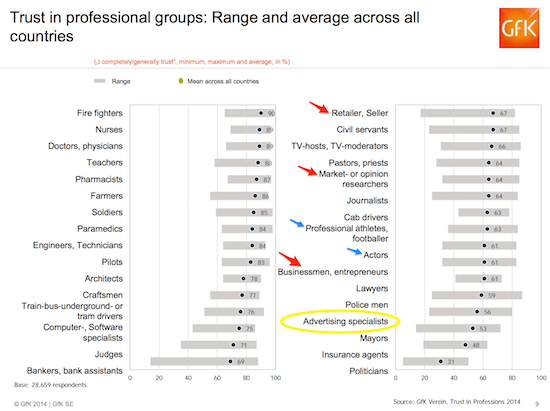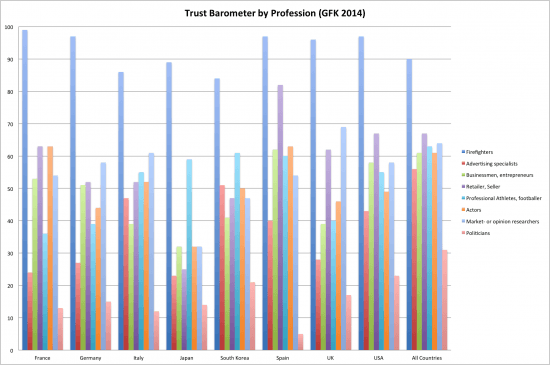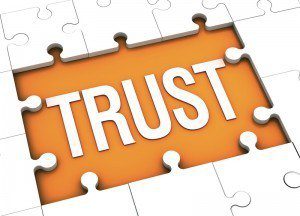
A recent study on Trust by GFK paints a rather gloomy picture for business executives and marketers. Whether it is the retailer, business executive (entrepreneur), advertising specialists (a proxy for marketers), market research team or celebrity spokesperson, people around the world place each of these professions in the lower half of trustworthiness (for the 32 professions selected).
Why the mistrust?
Only mayors, insurance agents and politicians are considered less trustworthy than advertising specialists. Oddly, bankers manage to beat (albeit on a rather broad shaded range) all the above professions that are related to business and brand building. Broken down by country (there are a total of 25 countries in the GFK study), the advertising specialists are consistently poorly noted. Where has this mistrust come from? Brands and we marketers are absolutely responsible for having driven the consumer to this deep-seated level of mistrust. It comes from having spent years trying to use any available communication technique and channel to pump out slogans, promises and images that are systematically a twisted version of the truth.

In the above cross-section of developed countries, using the same GFK study, the 6 professions that relate to brands are bookended by firefighters (top marks) and politicians (worst). Brands that use famous actors or sports personalities as celebrity spokespeople are potentially not doing themselves any favors in the trust category. I have long harped on about the poor shortcut that buying celebrity endorsements represents for brands. This study brings up three big questions…
What is trust?
Trust is not a singular value. If I were to ask you whether you would trust someone with a secret, you might have a different opinion as to whether you would trust that same person to buy low, sell high or defend you in a court of law. For example, I don’t trust lawyers, but I trust my own lawyer. One of the interesting tensions is whether/why we trust more institutions versus individuals. As individuals, we create our own definition of trust. Invariably, however, there is a degree of laxicity between how we operate ourselves and how we judge trustworthiness in others. A brand that has lasted the test of time may come with latent trustworthiness that does not spill over onto each employee. To a large degree, what will matter is the relative trust. For example, among news media outlets, some titles have garnered a higher level of trust (e.g. perceived independence or impartiality). Others have caved in to the commercial pressures and are merely about selling issues. Trust quickly comes into play when dealing with money, including when consumers must part with their own to buy your good or service.
Why is trust important?

Whereas trust was and has always been important for us, as human beings, thanks to new technologies, the level of trust can now be surfaced and observed with one click. People’s opinions, reviews, sentiment and satisfaction are generally available. Word of mouth (WOM) has always been the most powerful marketing “tool,” but in this new marketing world, WOM is anything but a tool. Sure the platforms (tools) now exist to spread word of mouth with epidemic speed, but only “if you’re worth it” to quote my former employer. Virality, buzz, social proof and recommendation can only be manipulated with great difficulty. As Chris Brogan and Julien Smith so aptly put it in their 2010 book Trust Agents, sales and marketers need to foster trust. And the new technologies available have changed the ways we have at our disposal to do this.
“[Digital natives] leverage the way the Web connects us and ties our information together to help turn transparency into an asset for doing business.”
With the chaos, anonymity and relative anarchy of the Internet, anything and everything is being said. Finding ways to cut through the noise and warrant trust is one of the big new skills that marketers and salespeople need to develop. {Please tweet this!}
How to gain trust as a brand?
There are any number of ways that we try to do this in our own lives. As an independent professional, we face the same challenge as commercial entities: competition and financial pressures. As a brand, there is an umbrella over all the individuals within. I have seen many cases where individuals manage to overcome the seedier reputation of the employer to do good business. However, chances are that when that individual moves, the clients will move with him/her as well. Here are the seven golden rules!
- Be true to who you are (genuine)
- Underpromise and overdeliver (execution is key) [Please tweet this!]
- Show don’t tell (actions speak louder than words) [Tweet this]
- Start with earning the trust of your employees (trust should be inside out) [Tweet this]
- Give before expecting in return (demonstrate generosity) [Tweet this!]
- Make sure that your communications are consistent throughout all channels (just because the intended audience is different does not excuse changing the intent of the message). This speaks to transparency. [Tweet this]
- Most importantly: Make sure that you are in business not just to make money (find your purpose) [Tweet this]
In good we trust
Perhaps, it’s taking a line out of the US currency, but when a business or an individual has a purpose that rises above the art of making money, there is a greater potential for trustworthiness. Philanthropic intentions and charitable donations are no guarantors of trust. However, if you demonstrate with integrity a higher purpose, human beings are inclined to imbue trust. And, as ever, trust must be earned. It’s just that the tools to do so have changed.











Trackbacks/Pingbacks